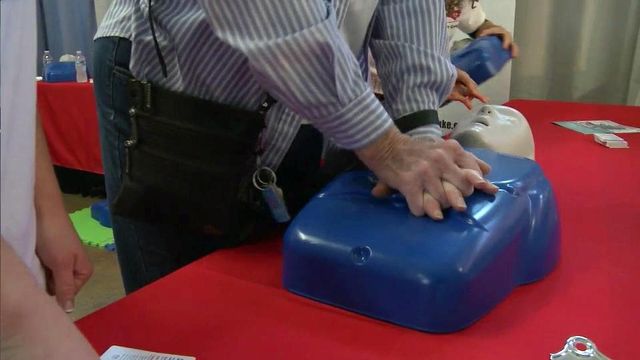State fair exhibit offers basic CPR training
An exhibit at this year's North Carolina State Fair is teaching fair-goers CPR basics that could help save a life.
Posted — UpdatedThe two were sitting and watching TV when the unexpected occurred. Jean Oakley heard her 76 year-old husband make a strange noise.
“He had his head flung back,” she said. “I rushed over, and he was turning blue. His eyes were open, but he obviously couldn’t see me."
The retired nurse called 911. The operator told her to do chest compressions.
A Duke University Hospitals-sponsored exhibit at this year’s State Fair is teaching fair-goers CPR basics just in case they ever find themselves in a position like the Oakleys.
More than 100 nurses and paramedics affiliated with Duke, Rex Healthcare and WakeMed are educating guests on how to recognize the symptoms of cardiac arrest. The exhibit is located in the Education Building on the end corner closest to Dorton Arena.
The exhibit will focus on teaching the three basics to CPR: checking to see if the person is awake, calling 911 and chest compressions.
Duke cardiologist Dr. James Jollis, who is also the current governor of the American College of Cardiology, says people used to learn a combination of mouth-to-mouth resuscitations with chest compressions.
Now, doctors know that chest compressions alone will keep blood and oxygen flowing to the brain until EMS arrives.
It had been over 30 years since Jean Oakley last performed CPR.
“When you have to do it, you can do it,” she said.
At Rex Hospital, Ken Oakley received a stent to open a blocked heart artery. Now he is feeling well and is thankful his wife knew what to do.
“It’s a miracle story,” Jollis said. “It shouldn’t have to be a miracle. It should happen every single time, if we just recognize what to do, call 911 and start compressions,” he added.
Everyone faces the possibility of being called on to perform CPR in any public place, WRAL Health Team correspondent Dr. Allen Mask says.
People are twice as like to survive if someone performs chest compressions. Mask encourages everyone to go to the fair and get trained. It only takes a few minutes.
• Credits
Copyright 2024 by Capitol Broadcasting Company. All rights reserved. This material may not be published, broadcast, rewritten or redistributed.






